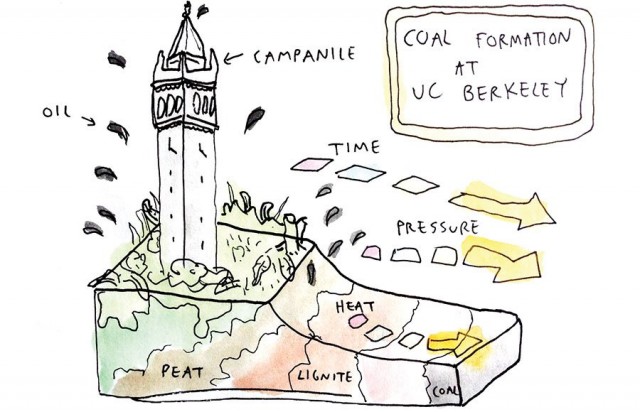Today, UC Berkeley and most institutions are financially invested in destroying our future.
This may sound a little bit surprising to some — even unfounded. Let me explain. When it comes to climate change, the scientific community has presented a clear, unambiguous message: Human burning of fossil fuels — coal, oil and natural gas — is putting our world at risk.
And this, in fact, is a needless risk. By immediately reducing greenhouse gas emissions, we can reduce the damages that we are currently on the path to creating. Typhoon Haiyan, Hurricane Sandy, Hurricane Katrina and many of the costly recent fires and droughts around the world have been exacerbated — caused, to one degree or another, by the changes in the climate that our reliance on fossil fuels has caused.
Though UC Berkeley and the UC system are leaders in addressing the climate crisis through groundbreaking research and education, the companies they have invested in continue to leave a significant “carbon signature” on the environment. Many of these investments were made before the full impact of these choices on the climate was clear. Continuing the financial investment in companies like Exxon, Chevron and ConocoPhillips — even though some of these companies have made a start in greening their portfolio — sends the wrong message. These companies, and many more, have the capacity and the opportunity to evolve from stalwarts of the old energy order that must change, into supporters of a new clean-energy system that California and the world desperately need.
The 200 largest fossil fuel companies hold, in the form of projects and assets, about five times the amount of carbon in their reserves that the scientific community has deemed responsible to even consider burning in order to avert runaway climate change. The several thousand researchers on the Intergovernmental Panel for Climate Change have determined with greater than 95 percent certainty that human activity is currently causing climate change. Researchers from across the entire UC system and our state government are critical leaders in efforts to advance both climate science and climate solutions, as well as the adaptation side of the equation.
The overwhelming majority of major energy companies, however, has shown far too few signs of transitioning to low-carbon projects. The fossil fuel industry collectively spends more than $600 billion per year exploring for new hydrocarbons and, in some cases, very significant amounts of money on climate denial, lobbying Congress to maintain fossil fuel subsidies and other efforts that work against the needed and feasible clean-energy transition. These companies are publicly traded and investor-owned, supported in large part by institutional investors like UC Berkeley and the University of California.
Instead of funding the problem, we should be investing in solutions that at once aid the transition to a low-carbon economy and grow our university’s bottom line. There is no lack of financially and environmentally sustainable reinvestment opportunities; as of yet, there is only a lack of leadership.
UC Berkeley has played a vital role as a leader in financial and social accountability. When other institutions refused, the campus listened to its students and the international calls for divestment from companies tied to grave social harm and injustice. As was similarly expressed during the South Africa, Sudan and tobacco divestment campaigns, students at UC Berkeley believe that their campus’s investments should reflect its values of social responsibility and environmental sustainability.
In the case of fossil fuel investments, divesting is not only the moral thing to do but is also financially prudent. As fossil fuel companies continue expanding their search for more hydrocarbons, the world’s carbon budget is shrinking. From Canadian tar sands to shale oil, the ”bottom of the barrel” is proving to be increasingly dirty. When government regulation aligns with this reality — and it must — the vast majority of reserves will have to stay in the ground unburned, rendering them stranded assets. Remaining invested in fossil fuels is a bad bet all around.
With a new chancellor at UC Berkeley and a new UC president, both of whom are leaders in clean energy and climate protection, divestment at UC Berkeley and across the UC system will send a resounding message that the university takes all facets of its leadership position seriously. It will also encourage other institutions to do the same and build pressure for regional and global climate action.
As a faculty member who understands deeply the challenge climate change poses and the urgency with which action must be taken, I call on my fellow faculty to stand with the students of Fossil Free Cal and Fossil Free UC in calling on Chancellor Dirks, President Napolitano and the president of the Berkeley Foundation to be on the right side of history by moving our endowments away from fossil fuels and reinvesting in a sustainable future. Visit fossilfreecal.org and sign on if you are as concerned as I am.
Daniel M. Kammen is a distinguished professor of energy in the Energy and Resources Group and in the Goldman School of Public Policy and is the envoy to the Americas for Clean Energy and Development.
